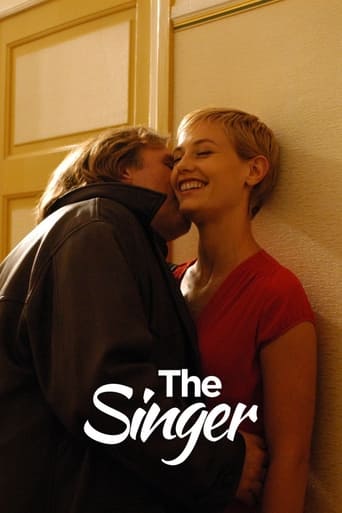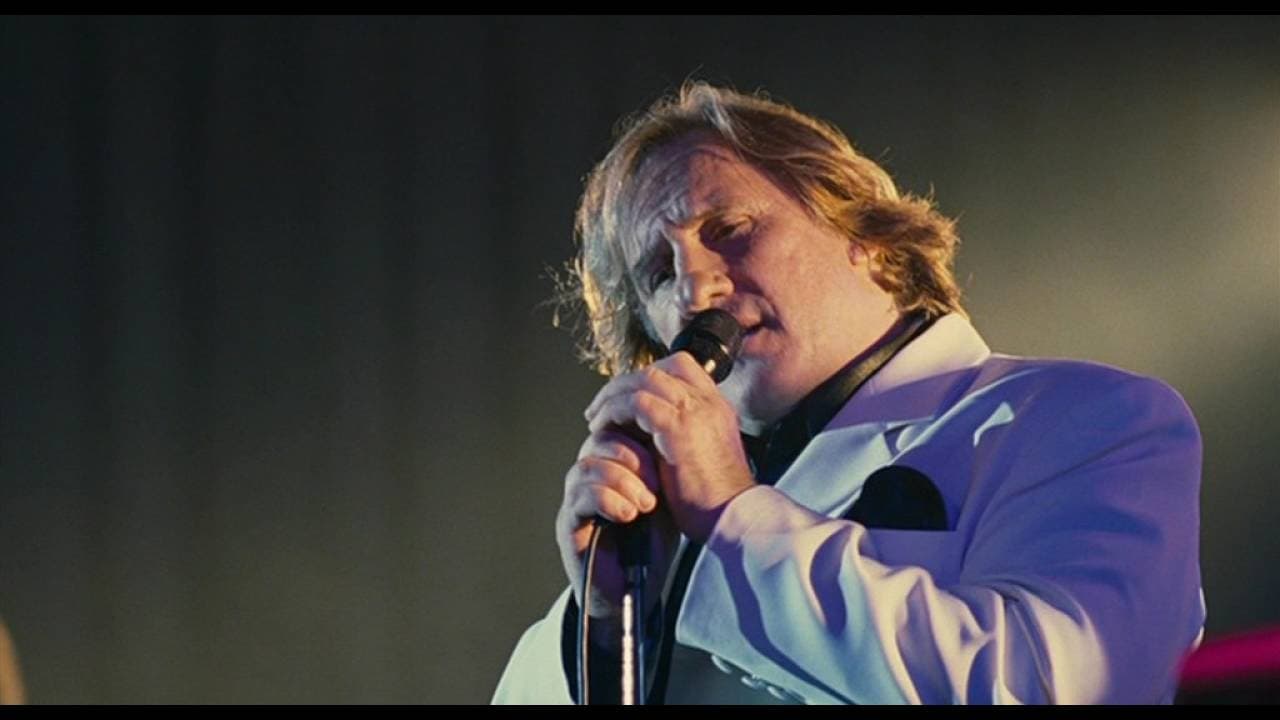johnnyboyz
One of the more remarkable things about Xavier Giannoli's French film The Singer is that it predates Aronofsky's The Wrestler by about two years. Like The Wrestler, Giannoli's film is about a man people of a certain age within the film's universe would no doubt look back on with fondness when thinking back to specific people within the annuls of a very specific, rather popular medium; that of music rather than professional wrestling entertainment. It is the tale of that man, much more older now, at a point in which dishevelment and old age appear to have kicked in; a realising of one's loneliness and one's stone cut chances passing one by. It is first and foremost a love story, a fascinating study of the duality that exists between the lead and another woman, whom, is rounded enough and suffers enough from her own problems to keep her from being a one dimensional love interest.The cut and dry figure of Gérard Depardieu is that of whom embodies the lead, the titular singer named Alain Moreau; a man we first see occupying a small and dingy little dressing room the local establishment appear to additionally store the vacuum cleaners inside of. Outside in the main hall, his portrait on a poster paints a far more positive image of him in his looking happy and holding a rose in the process as the place fills up with elderly people ready for a night of entertainment and socialising. The item of the strained differences in the man's existence as to what the public see and what's honestly lurking underneath, here, being the two different things which are brought to our attention. His life sees him work through the night with a band; their coming to an end with the conclusion of another gig seeing Moreau leave the establishment upon payment in the morning, both bleary eyed and a little shell shocked at the bright early light to an accompaniment of gentle electronic music. Moreau appears lonely, he sleeps at a relatively large home by himself and lives a generally muted existence with what seems to be nothing bar a pet fawn of some kind, whom totters around the house his closest form of company.The sense of life generally passing Moreau by is highlighted by way of a number of amusing quips to do with the distinction between young and old; the then and now; the modern and the classical. The item of 'older' people attending his shows is verbally illustrated by a character whom deems his audience members "too old for nightclubs" and so they attend Moreau's shows whereas Moreau's own views on the contemporary item of karaoke and the ability for any swinging-guy to have a bash at singing up on a stage, however badly, is dismissed. The greater extent of this particular statement enabling us to draw on comparisons to similar contemporary opinions extended to other art forms and mediums, namely television and cinema in the form of the rise of more online based opinions which hardened academics often state are trivialising forms of journalism if they aren't already destroying it.Through an old friend named Bruno, played by the ever dependable Mathieu Amalric so-much-so that he just appears to blend into proceedings, who used to be a bit of a gambler and now owns an estate agency; Moreau meets Marion (De France), a divorced woman who's dishevelment and downbeat nature matches that of our lead's and whom works with Bruno at the company. The subject matter and material the film eventually comes to cover is handled in a methodical and mature manner by director, also the writer, Giannoli. Moreau's organising of house visits purely to see her and the manner in which he keeps coming back neither as lecherous nor as misjudged as it might have been following the early spending of a night together. Principally, the two of them are linked more intrinsically by way of the nature of their jobs; Moreau the singer on stage at a designated place so as to guide customers through their nights out involving drinking and socialism, as Moreau himself verbally identifies that "they come here to drink champagne, that's all". In regards to Marion's role, her turning up to another designated establishment so as to show potential customers around a home they might buy bring to attention the fact that both people are present in their jobs, but not crucial; they add a dimension to an experience but appear largely unnecessary to proceedings as the greater extent of the trip unfolds around them.The character is explored in a fashion that sees come across as so much more than a mere photogenic supporting act, whom cannot get a man despite these qualities, and must act purely as the subject of another man's attraction. Their coming together is well observed and nicely unfolded; complications linked to Marion's own life situations involving grief additionally given ample attention. The film as a whole cracks along at a right old pace, its internal music propping everything up with a series of belting tracks which hop between fast and punchy numbers to slower, more resonating ballads nicely echoing the film's own ever-shifting atmosphere as the lead attempts to get to know his supporting female around the ever present Bruno. Giannoli's film is a mature mediation on middle age, a wonderfully involving tale of romantic affection and a well constructed study of two people at respective points in their lives.
Claudio Carvalho
The middle-age tacky singer of romantic songs Alain Moreau (Gérard Depardieu) is singing with his orchestra in the Royat Casino. When he meets the younger real-state agent Marion (Cécile De France) in the show with his friend Bruno (Mathieu Amalric), they have one night stand and Marion leaves the room without saying goodbye to him. Alain has a crush on Marion and seeks her out in her office telling that he wants to buy a house. Alain finds that she has a son and the distant Marion gets closer to Alain but the unrequited love drags him down."Quand j'Étais Chanteur" is a weird and messy romance. Gérard Depardieu and his character Alain Moreau are totally out of the league of the gorgeous Cécile De France and they do not have any chemistry along the whole story. The tacky songs of the movie are recommended for very specific audiences where I do not include myself; therefore, it is hard and boring to see Gérard Depardieu singing those songs. The footage of Stromboli (1950) is totally out of the context and last but not the least, the resemblance of Cécile De France with Patricia Arquette is amazing. My vote is five.Title (Brazil): "Quando Estou Amando" ("When I am in Love")
gsygsy
After seeing the trailer I didn't expect to enjoy this movie. Lesson: don't judge a movie by its trailer.Although it is a fairly corny affair, the setting is an unusual one, the performances and production values are high, and the script unexpectedly funny.However, without a star of considerable magnitude the entire soufflé would fall flat. Fortunately the great Depardieu is on hand, his giant presence matched by his lightness of touch. It's curious how the old American lions - de Niro, Pacino and the others - don't seem to be able to both play their image while sending it up at the same time: they only manage one thing or the other. In this modest movie, Depardieu is both himself and something of a parody of himself. The result is two-for-the-price-of-one enjoyment.The songs he sings - very well - are all genuine French pop songs which themselves border on self-parody, in the way that so many country-and western songs do - a seam of humour richly mined by Altman in Nashville. There's nothing so subtle here: Quand J'Etais Chanteur is so loosely woven that close scrutiny would unravel it. But for all that, it's surprisingly enjoyable.
jasoneden
I saw this film this afternoon at the London Fim Festival and loved it. You clearly got a sense of a singer in the twilight of his career observing either younger singers much better than understanding the needs of the audience than himself, or realising that his companions from years ago have done much better than he has.I sometimes felt that we were watching two stories, one about the Singer and another about the younger woman. Each had baggage, both were drawn to each other in ways they did not expect.go see this if you get the chance, and stay and watch the credits to find a few extras thrown in.


 AD
AD



